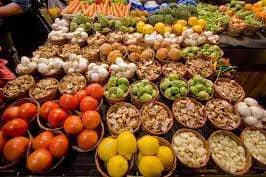To strengthen food safety, HCM City’s Food Safety and Hygiene Management Board will closely monitor foods sold by retailers to ensure customers buy products with clear origin.

Beeld: © AsemconnectVietnam
City authorities are also encouraging consumers to buy products with clear labels on origin.
The board, the city Department of Industry and Trade, and supermarkets and convenience stores have been instructed to keep strict control over food quality.
Pham Khanh Phong Lan, head of the board, said food production, processing, distribution, and import-export establishments would be closely monitored.
"Consumers like to buy food at traditional markets because they may be cheaper" but some products lack clear origins, she said.
"Upgrading food quality in traditional markets and enhancing modern distribution systems is essential."
Enterprises must comply with food safety regulations, work with the board to carry out quality control activities and provide samples for testing. They must contact the board about tracing origin of unsafe products.
Test results, warnings and other information should be publicised on websites to alert consumers, food producers and traders, she said.
Enterprises will be shamed and named on the board's website if they fail to disclose information about test results, she added.
Le Truong Son, deputy general director of Saigon Co.op, said his company only buys products from reputed manufacturers having food hygiene and safety certificates provided by competent authorities.
It also has teams to check the temperature, humidity and storage standard at each supermarket to ensure the products are always of the best quality when they reach consumers, he said.
The city produces 20-30 per cent of local food demand, and the rest comes from neighbouring provinces.
Over time, it has promoted effective management of agricultural production and consumption chains, with traceability and geographical indications ensuring food hygiene and safety.
But the scale remains small, and products, mostly raw, are only slightly processed.
The number of enterprises investing in agricultural production remains low, and wholesale markets associated with concentrated production areas have not developed in a co-ordinated manner./.
(VNS)
-------------------
DISCLAIMER
The above materials from the local newspapers are provided for informational purpose only. The content may include subjective parts and doesn't necessarily represents our own opinion. The Embassy therefore is not accountable for the objectiveness or accuracy of the content